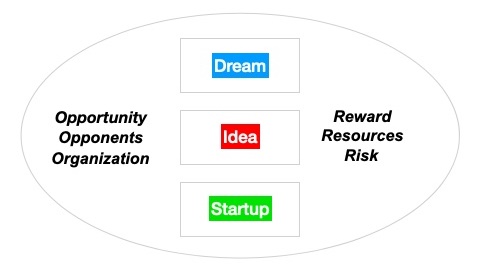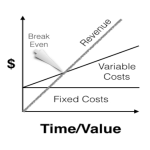Entrepreneur Perception & Intuition Founders See What Others Do Not
Entrepreneur Perception & Intuition: Clearly, successful entrepreneurs see things that others do not. Not surprisingly we tend to have differing perceptions of things, but the key to a winning new venture is being awake to opportunities and how you intend to meet the implicit needs or wants.
For instance take a look at the picture to the right:
Which line is longer?
I expect you answered the vertical, unless you already know about the Müller-Lyer illusion, named after a nineteenth century German sociologist—especially if you have good founder perception and natural intuition. If you did, you’d have given the right answer immediately, which is that both lines are the same length.
However, chances are high that you did choose the vertical. That would have been intuitive. A good entrepreneur would be happy with that choice, but would also have remained skeptical until a measurement was taken—that’s founder perception at work. A bit of reflective intuition and checking the facts would have soon reversed the choice to the correct answer.
Entrepreneurs love going with their intuition, but this is combined with the ability to evaluate options. Founder perception allows them to see both the upside and the downside. Don’t be fooled—by comparison with managers they may seem impulsive, but what is critical for them is the evaluation of risk. Their resources are either their own or ones for which they have a high degree of responsibility. Hence, conversely to the popular idea that entrepreneurs are defined by their ability to take risks, they always take only calculated risks, always except of course, the unsuccessful founders
Study Finds Top Traits for Entrepreneurs: Perception & Intuition
According to a 2017 study by CPP Inc. (now The Myers-Briggs Company, a BCorp), a firm that publishes the Myers-Briggs Type Indicator assessment, there are two top personality traits of entrepreneurs: intuition and perception (grasping the meaning by means of the senses or of the mind; cognition; understanding). Individuals with a preference for intuition are significantly more likely to become entrepreneurs than those who have other personality traits like sensing or judging, according to the firm’s findings. I can confirm this as an entrepreneur, being both an Intuitive and Perceiving type in Myers-Briggs terminology!
When I started my main business, I was working in a business school and had lots of very well qualified management teachers around me. Almost all of them thought that my business idea was terrible, because we were seeking to offer something that went against the professional grain. What I saw was an opportunity both to increase effectiveness and reduce cost. I was sufficiently farsighted to see beyond the stars quo. Because I wanted to come across as businesslike, I didn’t call it entrepreneur perception & intuition, but in retrospect I realize that it was.
Entrepreneurs Have Dreams and Fantasies
 Many think of entrepreneurs as ‘get rich quick’ merchants. The reality is for the most part very different. Today, concepts such as the unconscious, desires, dreams, fantasies, and the mind are increasingly used to explore topics related to leadership, learning, motivation at work, power, change, entrepreneurial processes, and public management issues.
Many think of entrepreneurs as ‘get rich quick’ merchants. The reality is for the most part very different. Today, concepts such as the unconscious, desires, dreams, fantasies, and the mind are increasingly used to explore topics related to leadership, learning, motivation at work, power, change, entrepreneurial processes, and public management issues.
If you like to read more, take a look at the article, “Entrepreneurial Behaviour and New Venture Creation: the Psychoanalytic Perspective”. Steve Jobs is always cited as a dreamer entrepreneur.
Not that I compare myself to him, when my main enterprise was forming in my mind, I saw it as existing. Though it was still a dream, at the same time it was real to me. Then, I had to do two main things: clarify my thinking enough to collect data, while hurling bricks at the growing edifice to see where the weaknesses lay.
Other Perspectives on Entrepreneur Perception & Intuition
There are many other parts of the Venture Founders site where you’ll find related items to read about what makes a successful entrepreneur. Among them you’ll find surprising help below:
- Entrepreneur Personality: know your own preferred way of being and appreciate others;
- First Class Noticers: founders are good at noticing what others miss;
- Entrepreneurial Empathy: founders set the character and ethics of the new venture by the way they behave;
- Entrepreneurs are Builders: one of the meanings of the French word ‘entrepreneur’ is builder;
- Behaviors of Successful Founders: some think it’s about risk-taking, but no it’s about mitigating risk.







